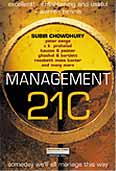
Wednesday, Dec 17, 2003

WHERE to find out how "Janusian vision, creative destruction, dualism, and collective genius inform the 21C leadership"? What do "customised workplace, the creative Web and kaleidoscope thinking mean for the 21C organisation"? Subir Chowdhury compiles the answers for these and other such questions in Management 21C , from Pearson Education. We are not talking about a bus-route number but the current century, and the book "brings together visions for the new millennium". It is for "those who believe in creative war." Subir adds in his preface: "Someday we'll all manage this way." Read on:
· For decades, organisations have utilised key metrics like ROI (return on investment) and ROA (return on assets). 21st century organisations will utilise a measurement called ROT (return on talent), that is, knowledge generated divided by investment in talents. ROT measures the payback from investment in people.
· Bill Gates admits that if 20 people were to leave Microsoft, the company would risk bankruptcy. Nathan Myhrwold, Chief Technology Officer there, claims that in the new economy, the difference between the average and the good is no longer a factor of 1:2; it is a factor of 1:100 or 1:1,000! At Nintendo, the computer games company, management argues that an ordinary person cannot design a really good game no matter how much he or she tries.
· Tomorrow's managers will create roles and structures that will ensure their people are always looking around for new opportunities. These roles will include: Converters - those taking today's technology and converting it to tomorrow's needs; scanners - people charged with finding new niches and customers; expediters - those who can help others to bypass red tape and bureaucratic regulations; browsers - employees who scan related industries, technologies and professions for ideas their organisations can use; linkers - those who persuade individuals and related companies to join short-term partnerships; energy conservers - people who look to plug drains in emotional, physical or intellectual energy brought about by ineffective managers or poor work environments; and talent scouts - those who look for people with the potential to become masters.
· Information technology now includes biotechnology; seeds given particular genes (a kind of `software' implanted in the seed) can result in insect-resistant crops with higher yields, replacing pesticides and the physical labour to spray them.
· Technology does not replace the need for human interaction and we believe that many companies in the future will miss this point to their detriment.
Quite often, information comes from those people to whom managers have easy access and with whom they get on. Decision-makers may use sources that provide lower quality information but are readily accessible.
A book that can offer a good ROT, that is, return on thoughts.